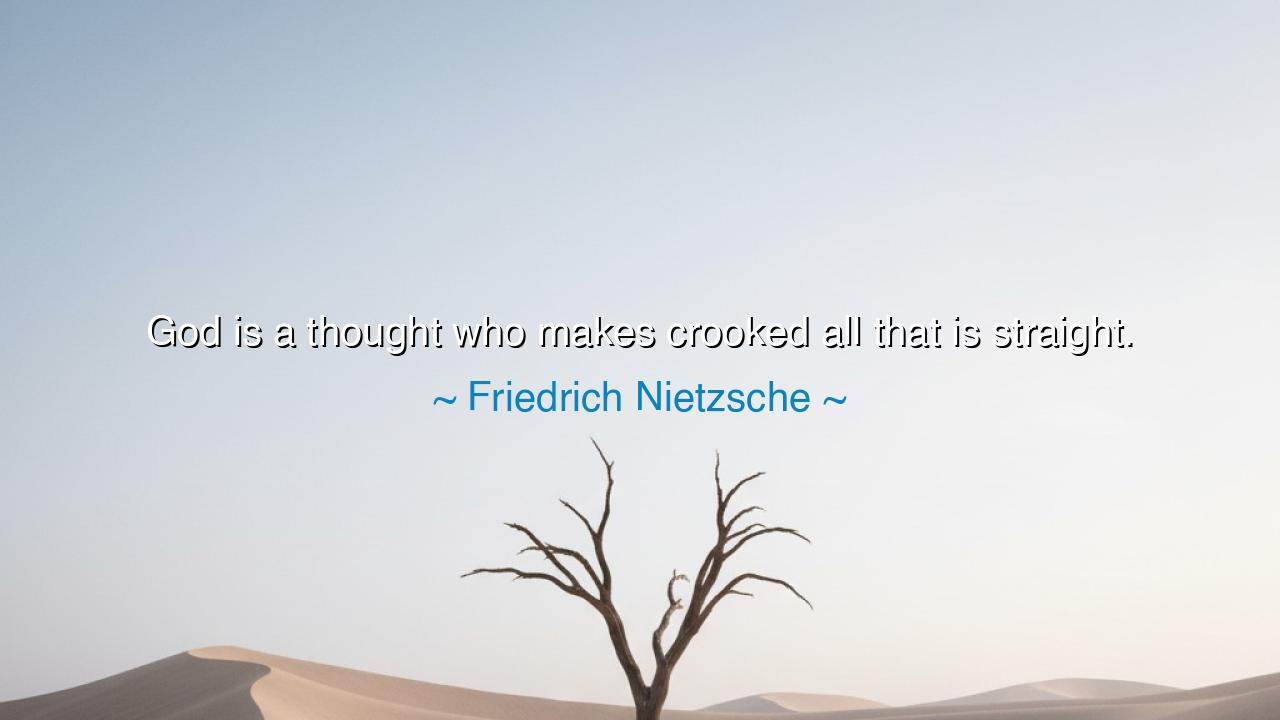
God is a thought who makes crooked all that is straight.






“God is a thought who makes crooked all that is straight.” — So wrote Friedrich Nietzsche, the fiery prophet of doubt and defiance, whose words cut like thunder through the calm certainties of his age. To understand this saying, one must hear it not as mere rebellion, but as a cry from the soul — the lament of one who looked upon the heavens and found them empty, yet still burned with the longing that once filled them. Nietzsche, who sought truth even at the cost of comfort, spoke here of the human mind’s invention of God — an idea so vast and powerful that it bends the very lines of thought, morality, and freedom itself.
In the depths of this statement lies a challenge. When Nietzsche declares that God is a thought, he does not mock the divine as childish fancy; rather, he confronts the idea that men, in creating God, have created both their highest hope and their deepest bondage. For in the name of this thought, humanity has shaped its morality, its politics, its art, its wars. And when he says that this thought “makes crooked all that is straight,” he means that what is simple and natural in man — his instincts, his passions, his will to live — becomes twisted beneath the weight of moral systems claiming divine authority. The straight path of life, guided by instinct and reason, becomes crooked when ruled by fear of sin and promise of heaven.
Nietzsche saw this not as the triumph of faith, but as the enslavement of spirit. To him, the image of God — especially the God of guilt and punishment — had become a shackle on the mind of man. The ancient Greeks, whom he admired, lived joyfully with their gods, who were not tyrants but mirrors of human beauty and struggle. But modern man, he believed, had turned God into a stern judge, demanding submission rather than growth. Thus, the divine thought that should have inspired greatness became a chain, twisting man’s strength into obedience and his pride into shame.
Yet Nietzsche’s words are not merely an accusation — they are also a revelation. He saw in the death of this God-thought the beginning of a new dawn, a call for humanity to rise beyond fear and superstition. If the idea of God had “made crooked” our understanding of life, then the task before mankind was to straighten it again — to rediscover meaning not in heaven, but within the human spirit itself. From this conviction sprang his vision of the Übermensch, the higher man who creates his own values and walks upright in a world freed from divine command.
History has often proved his warning true. Consider how, through the ages, rulers and zealots have invoked the name of God to justify cruelty — to silence reason, to burn the innocent, to conquer and enslave. The Inquisition, the witch hunts, the wars of religion — all were waged by those who claimed to defend the sacred, yet in doing so perverted what was straight into monstrous forms. The thought of God, when corrupted by power, becomes a sword in the hands of men who cannot bear their own shadows. Nietzsche saw this clearly: the danger lies not in belief itself, but in worshipping one’s own fear under the name of holiness.
And yet, there is also irony here, for Nietzsche’s struggle with God was itself a kind of worship. He wrestled not with indifference, but with the divine as Jacob wrestled the angel — fiercely, passionately, until dawn. In denouncing the thought of God, he affirmed the yearning for transcendence that still burned in him. His rebellion was not against the sacred, but against its distortion. He sought to free the divine spark within man from the crooked doctrines that had imprisoned it. In this way, his words are both a warning and a plea: do not let the idea of God make you smaller than you are.
So what lesson shall we draw from this bold and trembling thought? It is not a call to atheism alone, but to authenticity — to question what has been handed down, to strip truth of disguise, to stand in the open air of freedom. Whether you believe in God or not, beware of any idea, sacred or secular, that bends the straight line of your soul into fear or conformity. The divine must uplift, not enslave; it must awaken, not deaden. Let your faith, if you have it, be living and creative, not bound to dogma but rooted in love and courage.
For the true spirit of Nietzsche’s cry is this: that man must walk upright — not under the shadow of invented guilt, but in the full sunlight of truth. God, as a thought, can make crooked what was once straight; but love, wisdom, and courage can make straight again what fear has deformed. Seek, then, a faith or a philosophy that honors your life, your reason, and your freedom. Let your reverence be for what is real, luminous, and life-giving, and not for what chains the soul. In doing so, you will fulfill the highest meaning of Nietzsche’s paradox — you will take back the power to shape your own destiny, as a being made not for submission, but for creation.






AAdministratorAdministrator
Welcome, honored guests. Please leave a comment, we will respond soon